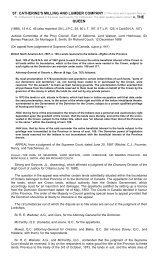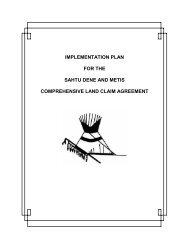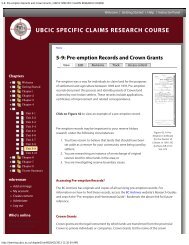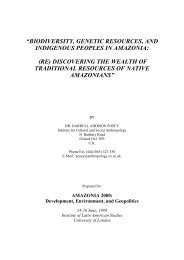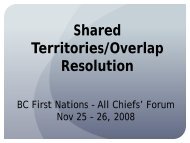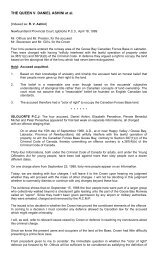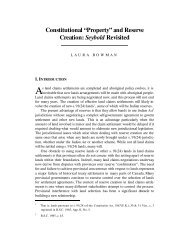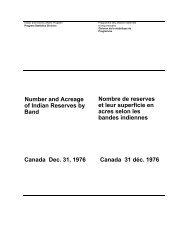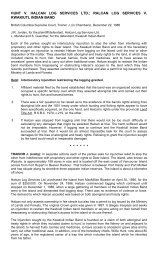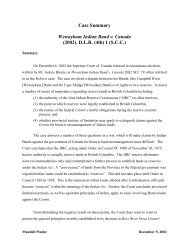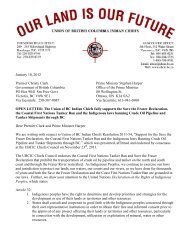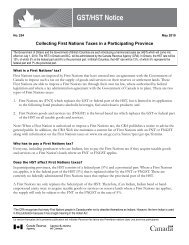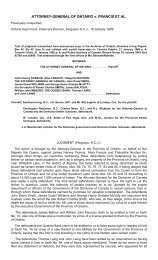ATTORNEY GENERAL for ONTARIO (Respondent) v. BEAR ...
ATTORNEY GENERAL for ONTARIO (Respondent) v. BEAR ...
ATTORNEY GENERAL for ONTARIO (Respondent) v. BEAR ...
You also want an ePaper? Increase the reach of your titles
YUMPU automatically turns print PDFs into web optimized ePapers that Google loves.
3. Robinson-Huron Treaty as a Sovereign Act of ExtinguishmentEven if it could be said that the Temagami Band was not a signatory to or did not adhere to theRobinson-Huron Treaty, there is yet another basis upon which it can be said that the treatyoperates to extinguish the aboriginal claims of the appellants. The treaty is an expression of thewill of the sovereign to extinguish aboriginal rights.This proposition must begin with a determination of what land was included in the Robinson-HuronTreaty. The learned trial judge found that the whole of the Land Claim Area was within the landsintended to be covered by the Robinson-Huron Treaty. The treaty itself describes the lands asfollows:. . . the Eastern and Northern Shores of Lake Huron, from Penetanguishene to Sault Ste.Marie, and thence to Batchewanaung Bay, on the Northern Shore of Lake Superior; togetherwith the Islands in the said Lakes, opposite to the Shores thereof, and inland to the Height ofland which separates the Territory covered by the charter of the Honorable Hudson BayCompany from Canada; as well as all unconceded lands within the limits of Canada West towhich they have any just claim . . . .The eastern boundary of Canada West was the same boundary as now exists between Ontarioand Quebec and includes Lakes Temiskaming, Nipissing and Temagami. This interpretation of theland described in the treaty is confirmed by subsequent events. Until the present dispute arose,the Temagami Indians never took the position that their traditional lands were outside the treatyarea. In the beginning (1850 to 1856), they accepted benefits pursuant to the treaty and laterargued that they had been omitted from the treaty and wished to be included. However, theunderlying assumption was always that the Temagami hunting grounds were within the Robinson-Huron Treaty area.It is apparent as well that the province of Canada and later the province of Ontario and the federalgovernment in their subsequent dealings with the Temagami Indians always considered theTemagami lands to be within the area covered by the Robinson-Huron Treaty. We think it obviousthat the Land Claim Area is within the treaty area and that it cannot be reasonably arguedotherwise.On November 9, 1850, the Robinson-Huron Treaty was laid be<strong>for</strong>e the Governor General inCouncil of the province of Canada, declared to be "ratified and confirmed," and directed to beregistered in the office of the Registrar General. Thus, in our view, it was clear that the Sovereign,acting through the Governor General in Council, intended to take the lands in question.It is clear that aboriginal rights at common law alone (which may pertain to a small part of the LandClaim Area) and aboriginal rights recognized by the Royal Proclamation (which may apply to mostof the Land Claim Area) exist at the pleasure of the Crown.The relevant part of the Royal Proclamation is as follows:And We do further declare it to be Our Royal Will and Pleasure, <strong>for</strong> the present as a<strong>for</strong>esaid,to reserve under our Sovereignty, Protection, and Dominion, <strong>for</strong> the use of the said Indians,all the Lands and Territories not included within the Limits of Our said Three newGovernments, or within the Limits of the Territory granted to the Hudson's Bay Company, asalso all the Lands and Territories lying to the Westward of the Sources of the Rivers whichfall into the Sea from the West and North West as a<strong>for</strong>esaid.It is also clear that (at least prior to the enactment of the Canadian Charter of Rights and Freedomsin 1982) that the sovereign power can unilaterally extinguish aboriginal rights. In Calder v.Attorney-General of British Columbia, [1973] S.C.R. 313, Mr. Justice Judson, writing <strong>for</strong> himself,Martland and Ritchie JJ., quoted the United States Supreme Court with approval as follows atpp.334-35:Extinguishment of Indian title based on aboriginal possession is of course a different matter.The power of Congress in that regard is supreme. The manner, method and time of suchextinguishment raise political, not justiciable, issues. Buttz v. Northern Pacific Railroad. Asstated by Chief Justice Marshall in Johnson v. M'Intosh, "the exclusive right of the UnitedStates to extinguish" Indian title has never been doubted. And whether it be done by treaty,by the sword, by purchase, by the exercise of complete dominion adverse to the right ofoccupancy, or otherwise, its justness is not open to inquiry in the courts. Beecher v.



